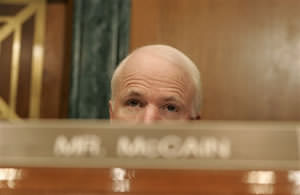McCain Campaign: Not Dead Yet
Although John McCain has made several serious missteps in his bid for the presidency, and although pundits and politicos alike have all but sounded the death knell for his campaign, McCain may still have the wild-card potential to make a comeback -- especially if President Bush gives him even the slightest boost.
Even though Sen. John McCain is still walking and talking like a candidate, the nation’s political writers and pundits are hammering the final nails in his presidential campaign coffin and preparing to bury it in his Arizona desert.
“They never come back,” Robert Novak said Sunday on “Meet the Press.” “I think there is a 40 percent chance he gets out of this thing in the fall,” said fellow panelist Al Hunt. Host Tim Russert quoted this devastating comment from political analyst Charlie Cook: “Let’s have a moment of silence. The physicians have left the room and now it’s the executors of the will taking over.” In New York magazine, John Heilemann outdid Cook, writing, “Though it’s not impossible to conjure a narrative in which McCain wins the nomination, doing so requires half a bottle of Maker’s Mark, followed by a nitrous-oxide chaser.”
Not that a burial of McCain’s campaign is a bad idea. It’s appalling to contemplate McCain as president in view of his unstinting support of President Bush’s Iraq war and his pledge to increase the Army and Marines from the presently contemplated 750,000 to 900,000.
We don’t need a president who believes: “Democratic candidates for president will argue for the course of cutting our losses and walking away from the threat in the vain hope it will not follow us here. I cannot join in such wishful and very dangerous thinking.”
But don’t dismiss him. McCain remains the greatest threat to a Democratic victory next year. Believing the media analyses and writing McCain off now could be a big mistake.
There is good reason to be suspicious of these analyses. The number of examples of journalistic wrongheadedness is endless. One of the worst was the coverage of Al Gore’s 2000 presidential campaign. Reporters were charmed by George W. Bush’s frat-boy style and stupid nicknames. Bewitched, they turned the smart, forward-looking, talented Gore into a muddle-headed liar and bore. As Eric Alterman wrote in The Nation last week, “That Al Gore’s 2000 presidential candidacy was treated unconscionably by most members of the mainstream media is not really arguable by sentient beings.”
Another favorite example eerily parallels the McCain situation. In 1980, Ronald Reagan’s presidential campaign was spending too much. The staff was in turmoil. It’s hard to believe now, when the late president is so lionized, but the press was writing him off, especially after George H.W. Bush’s win in the Iowa caucuses. But Reagan brought in people who imposed tight fiscal control, smashed Bush in a New Hampshire debate and went on from there.
Amid the turmoil of his campaign, McCain has a few things going for him. The most important, ironically, is his support of the unpopular war. Neither Bush nor his cheerleaders have McCain’s military record or his stature in that area. Nor do they have his ability to articulate their beliefs.
As his campaign organization was falling apart, McCain headed to Concord, N.H., where he gave an unrelentingly pro-war speech. “Defeatism will not buy peace in our time,” he told the Concord Chamber of Commerce. “It will only lead to more bloodshed, to more American casualties in the future. If we choose to lose in Iraq, our enemies will hit us harder in Afghanistan hoping to erode our political will and encourage calls in Western capitals for withdrawal and accommodation with our enemy there as well.” He concluded by saying, “Peace at any price is an illusion and its costs are always more tragic than the sacrifices victory requires.”
In the real world, this is craziness. But in the Republican world, it makes sense. Just 38 percent of Republicans polled by CNN in June opposed the war. While the number of opponents is increasing, the figure still means the great majority of Republicans are in favor. For them, McCain is sounding the right note.
It’s also the right note for his old foe, President Bush. Unless Bush is a total ingrate for McCain’s support for the war (and maybe he is) he could be a great help to McCain in raising money. He wouldn’t openly intervene. But one of his infamous winks or a message sent by a circuitous route would put McCain back in the game. The senator is not that far out of it. Despite his troubles, some polls have McCain competitive in South Carolina and New Hampshire.
If he survives and even comes close to winning in such states, the reporters writing McCain’s obituary would switch to a fresh story, his comeback. The comeback story would hurt even McCain’s strongest competitors, former New York Mayor Rudolph Giuliani and the undeclared Fred Thompson, both of whom have enormous weaknesses.
I don’t want McCain to win the Republican nomination. He’s a wild card. I don’t know how well he would campaign in the fall. Logic says there is no chance of him or any other Republican winning. But McCain is unorthodox, always on the edge, a mixture of anger and affability, and a famous ex-POW. He’s capable of shifting his positions, as he did earlier in the year to get in the good graces of the religious right. All that, plus Republican money, would be a dangerous combination in fall 2008.
Your support matters…Independent journalism is under threat and overshadowed by heavily funded mainstream media.
You can help level the playing field. Become a member.
Your tax-deductible contribution keeps us digging beneath the headlines to give you thought-provoking, investigative reporting and analysis that unearths what's really happening- without compromise.
Give today to support our courageous, independent journalists.






You need to be a supporter to comment.
There are currently no responses to this article.
Be the first to respond.